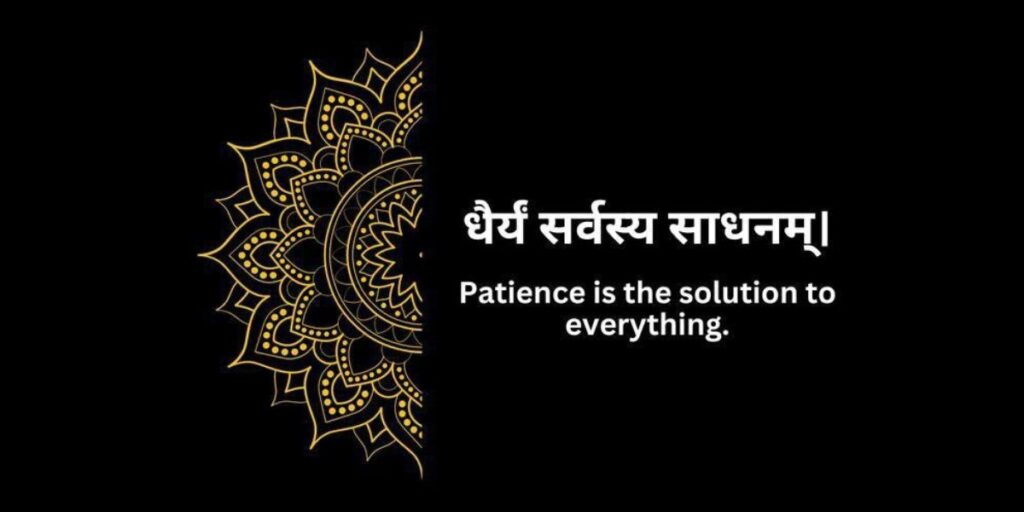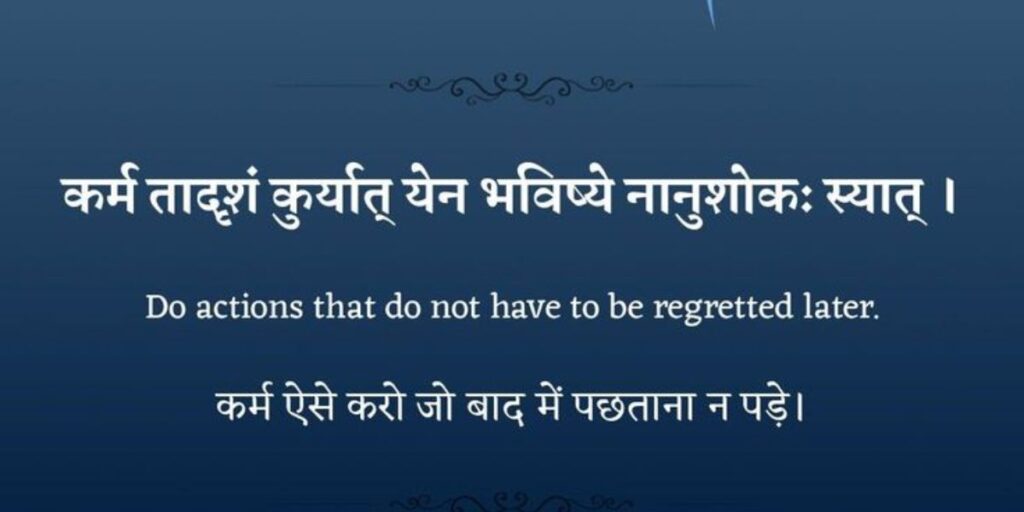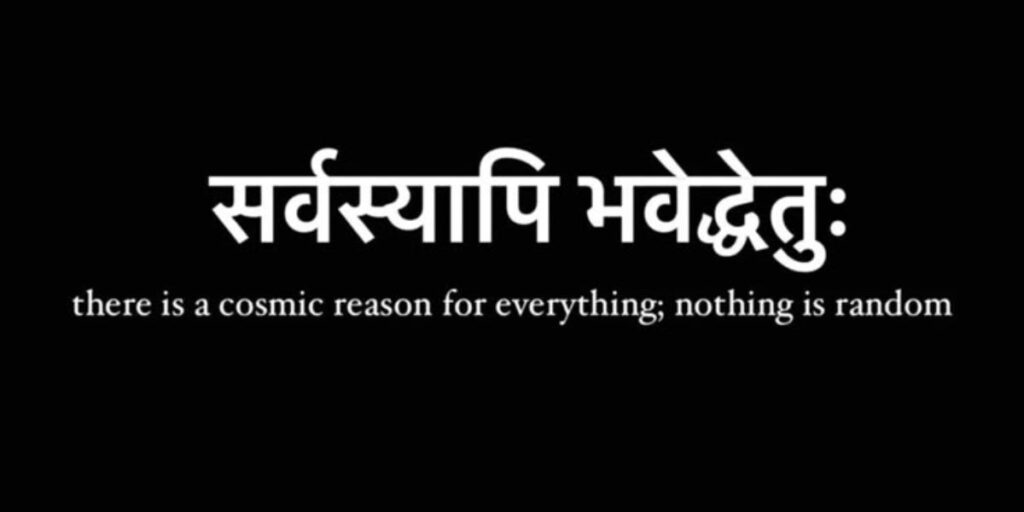Karma, which is central to Eastern philosophy and spirituality, has been used as a way to explain cause and effect for people for many centuries. For many generations, karma quotes in Sanskrit texts have guided individuals toward a righteous and spiritual life. The ideas found in parables are respected by many cultures and religions and they continue to provide valuable lessons about what we should and shouldn’t do in our everyday lives. In Sanskrit, karma means ‘action’ or ‘deed,’ although the principle it represents tells us that every action leads to a corresponding effect, forming a record of our lives known as a spiritual balance sheet that shapes our lives.
Many verses in the Bhagavad Gita and Upanishads and other older Sanskrit texts, discuss the many ways karma works. According to these texts, our actions and words leave their mark on us throughout all our lifetimes. When everything seems quick and distant these days, these Sanskrit sayings push us to remember that our actions spread through the world and affect ourselves. Understanding karma can help anyone, whether religious or not, live more wisely, responsibly and with more purpose.
In this collection, I bring together the most meaningful Karma quotes in sanskrit and I include their translation for those who seek wise counsel now.
Understanding Karma: The Law of Karma and Types of Karma
Karma acts as a basic natural law in Eastern traditions as precisely and predictably as gravity. Because of this law, various acts can lead to consequences that will be returned to those who started them. Unlike the belief that everything is already decided for us, karma tells us we are in charge of our future due to the actions we take today.
Hindu scriptures group karma into a variety of types. Every action we did in our previous lives is invisible in our mind as sanchita karma until they are ready to produce effects in this life.
Besides other messages, the Bhagavad Gita shlokas on karma also point out that acting without desire for the result brings the most peace and is the best kind of action. Although we cannot approach other effects of karma, these teachings urge us to act wisely now and serve those around us to change things for the better in our lives. The Sanskrit quotes on karma and life found in these texts continue to inspire a conscious way of living.
You Might Like: Sanskrit bio for Instagram
Top 250+ Karma Quotes from the Bhagavad Gita
1. Karma Quotes in Sanskrit from the Bhagavad Gita

The Bhagavad Gita has a special place in humanity’s religious heritage, as Lord Krishna talks to Arjuna about important spiritual truths during their battle at Kurukshetra. This text gives important advice on karma, our duties and what is right. Karma quotes in Sanskrit from the Gita show the proper way to act and their results, pointing those seeking truth away from attachment and toward freedom.
“कर्मण्येवाधिकारस्ते मा फलेषु कदाचन। मा कर्मफलहेतुर्भूर्मा ते सङ्गोऽस्त्वकर्मणि॥” (Bhagavad Gita 2.47)
“You have the right to perform your prescribed duties, but you are not entitled to the fruits of your actions. Never consider yourself to be theaa cause of the results of your activities, nor be attached to inaction.”
“योगस्थः कुरु कर्माणि सङ्गं त्यक्त्वा धनञ्जय। सिद्ध्यसिद्ध्योः समो भूत्वा समत्वं योग उच्यते॥” (Bhagavad Gita 2.48)
“Established in yoga, perform actions abandoning attachment, remaining equal in success and failure. This equanimity is called yoga.”
“दूरेण ह्यवरं कर्म बुद्धियोगाद्धनञ्जय। बुद्धौ शरणमन्विच्छ कृपणाः फलहेतवः॥” (Bhagavad Gita 2.49)
“Action performed with selfish motives is far inferior to action performed with equanimity of mind, Arjuna. Seek refuge in this balanced state of intellect. Those who work only for rewards are misers.”
“यत्करोषि यदश्नासि यज्जुहोषि ददासि यत्। यत्तपस्यसि कौन्तेय तत्कुरुष्व मदर्पणम्॥” (Bhagavad Gita 9.27)
“Whatever you do, whatever you eat, whatever you offer in sacrifice, whatever you give away, and whatever austerities you perform – do all this as an offering to Me.”
“अनन्याश्चिन्तयन्तो मां ये जनाः पर्युपासते। तेषां नित्याभियुक्तानां योगक्षेमं वहाम्यहम्॥” (Bhagavad Gita 9.22)
“For those who worship Me exclusively with no other thought, who are ever devoted – I provide what they lack and preserve what they have.”
Also Read: Short Assamese caption for Instagram
2. Timeless Karma Quotes in Sanskrit from Other Scriptures

Besides the Bhagavad Gita, numerous old Sanskrit works explore the concept of karma. Upanishads, Puranas, Yoga Sutras and additional texts provide beneficial insights about how karma plays a role in our lives. The Sanskrit quotes about karma included here show how central it is in all major Indian philosophical and spiritual systems.
“यथा कर्म तथा फलम्” (Brihadaranyaka Upanishad)
“As is the action, so is the result.”
“अदृष्टं दृष्टवत् नाशं दृष्टं नश्यत्येव तु” (Yoga Vasishtha)
“The unseen karma is destroyed on being seen (through self-knowledge), while the seen karma perishes after yielding its fruits.”
“यद्भावं तद्भवति” (Upanishads)
“As is your conviction, so is your outcome.”
“कर्मणा बध्यते जंतुः विद्यया तु प्रमुच्यते” (Vishnu Purana)
“By action beings are bound, by knowledge they are liberated.”
“अन्नमयं हि सौम्य मनः आपोमयः प्राणः” (Chandogya Upanishad)
“The mind, dear one, consists of food; the life-breath consists of water.”
3. Best Sanskrit Shlok on Karma

A number of Sanskrit lines about karma are especially distinguished by how easily understood, impressive or useful they are. Such wise words break down difficult karmic rules into straightforward lessons loved by seekers over many years. Below are a few of the most respected karma quotes from Sanskrit that remain meaningful.
“यादृशी भावना यस्य सिद्धिर्भवति तादृशी” (Panchatantra)
“As is one’s thought, so is one’s achievement.”
“कर्मानुबन्धीनि मानुषलोके” (Hitopadesa)
“In this world of mortals, all are bound by their karma.”
“अकृतं दुष्कृतं चैव कृतं च विकृतं तथा। सर्वं कर्मफलं भुङ्क्ते कर्ता नान्यः कथञ्चन॥” (Garuda Purana)
“The doer alone experiences the consequences of actions not done, improperly done, properly done, or overdone—no one else can partake of these.”
“अवश्यमेव भोक्तव्यं कृतं कर्म शुभाशुभम्। नाभुक्तं क्षीयते कर्म कल्पकोटिशतैरपि॥” (Mahabharata)
“The results of good and bad karma must inevitably be experienced. Karma does not diminish even after hundreds of millions of aeons if it remains unexperienced.”
4. Karma Sanskrit Quotes With Hindi Meaning

For those who love Hindi, the messages in these karma quotes have been given with a Hindi counterpart to make sure anyone can appreciate them. You can feel the original energy of Sanskrit in the book, yet the meaning is easily understood in Hindi.
कर्मण्येवाधिकारस्ते मा फलेषु कदाचन।
Hindi Meaning: तुम्हारा अधिकार केवल कर्म करने में है, उसके फलों में नहीं।
कर्म ज्यायो ह्यकर्मणः।
Hindi Meaning: कर्म करना अकर्म (कुछ न करना) से श्रेष्ठ है।
सर्वे कर्मवशा वयम्।
Hindi Meaning: हम सभी कर्म के अधीन हैं।
कर्मणा जायते जन्तुः कर्मणैव विलीयते।
Hindi Meaning: प्राणी कर्म से जन्म लेता है और कर्म से ही विलीन होता है।
येन केन प्रकारेण कर्मणैव समाचरेत्।
Hindi Meaning: किसी भी प्रकार से कर्म करना चाहिए।
कर्मणो ह्यपि बोद्धव्यं बोद्धव्यं च विकर्मणः।
Hindi Meaning: कर्म और विकर्म (दुष्कर्म) दोनों को जानना आवश्यक है।
कर्मणा बन्धनं प्राप्य मोक्षं प्राप्नोति कर्मणा।
Hindi Meaning: कर्म से बंधन होता है और कर्म से ही मोक्ष की प्राप्ति होती है।
कर्मणा जायते सिद्धिः।
Hindi Meaning: कर्म से ही सिद्धि प्राप्त होती है।
कर्मणि एव हि संसिद्धिः।
Hindi Meaning: कर्म में ही पूर्णता है।
कर्मणा हि सदा सिद्धिः।
Hindi Meaning: कर्म से ही सदा सिद्धि प्राप्त होती है।
कर्मणैव हि संसिद्धिः।
Hindi Meaning: कर्म से ही पूर्णता प्राप्त होती है।
कर्मणा हि सदा मोक्षः।
Hindi Meaning: कर्म से ही सदा मोक्ष प्राप्त होता है।
कर्मणा हि सदा सुखम्।
Hindi Meaning: कर्म से ही सदा सुख प्राप्त होता है।
कर्मणा हि सदा शान्तिः।
Hindi Meaning: कर्म से ही सदा शांति प्राप्त होती है।
कर्मणा हि सदा ज्ञानम्।
Hindi Meaning: कर्म से ही सदा ज्ञान प्राप्त होता है।
कर्मणा हि सदा धर्मः।
Hindi Meaning: कर्म से ही सदा धर्म की प्राप्ति होती है।
कर्मणा हि सदा अर्थः।
Hindi Meaning: कर्म से ही सदा अर्थ (धन) की प्राप्ति होती है।
कर्मणा हि सदा कामः।
Hindi Meaning: कर्म से ही सदा काम (इच्छा) की पूर्ति होती है।
कर्मणा हि सदा मोक्षः।
Hindi Meaning: कर्म से ही सदा मोक्ष की प्राप्ति होती है।
कर्मणा हि सदा सिद्धिः।
Hindi Meaning: कर्म से ही सदा सिद्धि प्राप्त होती है।
5. Geeta Shlok on Karma in Hindi

What the Bhagavad Gita explains about karma is very important in Hindu thought. The text is rich with karma quotes in Sanskrit that reflect deep philosophical truths about action and consequence. Here are some verses from this holy book dealing with karma, along with their Hindi translations to benefit more people.
कर्मण्येवाधिकारस्ते मा फलेषु कदाचन। मा कर्मफलहेतुर्भूर्मा ते सङ्गोऽस्त्वकर्मणि॥
(गीता 2.47)
भावार्थ: तेरा अधिकार सिर्फ कर्म करने में है, फलों में नहीं। तू कर्म के फल का कारण मत बन और न ही अकर्मण्यता में आसक्त हो।
योगस्थः कुरु कर्माणि सङ्गं त्यक्त्वा धनञ्जय। सिद्ध्यसिद्ध्योः समो भूत्वा समत्वं योग उच्यते॥
(गीता 2.48)
भावार्थ: हे धनंजय! समत्व बुद्धि से युक्त होकर कर्म कर, सफलता और असफलता में समान भाव रख – यही योग कहलाता है।
बुद्धियुक्तो जहातीह उभे सुकृतदुष्कृते। तस्माद्योगाय युज्यस्व योगः कर्मसु कौशलम्॥
(गीता 2.50)
भावार्थ: बुद्धियोग से युक्त व्यक्ति पुण्य और पाप दोनों से ऊपर उठ जाता है। इसलिए तू योग में लग जा, क्योंकि योग ही कर्मों में कुशलता है।
न हि कश्चित्क्षणमपि जातु तिष्ठत्यकर्मकृत्। कार्यते ह्यवशः कर्म सर्वः प्रकृतिजैर्गुणैः॥
(गीता 3.5)
भावार्थ: कोई भी व्यक्ति एक क्षण भी बिना कर्म के नहीं रह सकता। सब लोग प्रकृति के गुणों के वश होकर कर्म करते हैं।
यज्ञार्थात्कर्मणोऽन्यत्र लोकोऽयं कर्मबन्धनः। तदर्थं कर्म कौन्तेय मुक्तसंगः समाचर॥
(गीता 3.9)
भावार्थ: यज्ञ (उच्च उद्देश्य) के लिए किए गए कर्मों को छोड़कर किया गया हर कर्म बंधन देने वाला है। इसलिए आसक्ति छोड़ कर कार्य कर।
सहयज्ञाः प्रजाः सृष्ट्वा पुरोवाच प्रजापतिः। अनेन प्रसविष्यध्वमेष वोऽस्त्विष्टकामधुक्॥
(गीता 3.10)
भावार्थ: सृष्टि के आरंभ में ब्रह्मा ने प्रजाओं को यज्ञ सहित रचा और कहा – इससे तुम समृद्ध होओ, यह तुम्हारी इच्छाओं को पूर्ण करेगा।
नियतं कुरु कर्म त्वं कर्म ज्यायो ह्यकर्मणः। शरीरयात्रापि च ते न प्रसिद्ध्येदकर्मणः॥
(गीता 3.8)
भावार्थ: तू नियत कर्म अवश्य कर, क्योंकि कर्म न करना, कर्म करने से श्रेष्ठ नहीं है। शरीर की यात्रा भी बिना कर्म के संभव नहीं।
कर्मणैव हि संसिद्धिमास्थिता जनकादयः। लोकसंग्रहमेवापि सम्पश्यन्कर्तुमर्हसि॥
(गीता 3.20)
भावार्थ: जनक आदि राजाओं ने भी केवल कर्म करते हुए सिद्धि प्राप्त की। इसलिए लोक कल्याण की दृष्टि से भी तुझे कर्म करना चाहिए।
न मे पार्थास्ति कर्तव्यं त्रिषु लोकेषु किञ्चन। नानवाप्तमवाप्तव्यं वर्त एव च कर्मणि॥
(गीता 3.22)
भावार्थ: हे अर्जुन! तीनों लोकों में मेरे लिए कोई भी कर्तव्य नहीं है, फिर भी मैं कर्म करता हूँ – ताकि लोग अनुकरण करें।
श्रेयान्स्वधर्मो विगुणः परधर्मात्स्वनुष्ठितात्। स्वधर्मे निधनं श्रेयः परधर्मो भयावहः॥
(गीता 3.35)
भावार्थ: अपने दोषयुक्त धर्म का पालन करना भी पराये धर्म को अपनाने से श्रेष्ठ है। अपने धर्म में मृत्यु भी कल्याणकारी है, पराया धर्म भय देने वाला है।
6. Sanskrit Quote on Karma

Many concise and meaningful statements in Sanskrit literature explain karmic concepts well. Such quotes from the study of karma in Sanskrit explain complicated ideas so that we can put them into use in our daily lives.
“कर्मायत्तं फलम्”
“The fruit depends on the action.”
“जातस्य हि ध्रुवो मृत्युर्ध्रुवं जन्म मृतस्य च।”
“For one who is born, death is certain; for one who dies, birth is certain.”
“यत्करोषि यदश्नासि यज्जुहोषि ददासि यत्। यत्तपस्यसि कौन्तेय तत्कुरुष्व मदर्पणम्॥”
“Whatever you do, whatever you eat, whatever you offer in sacrifice, whatever you give away, and whatever austerities you perform – do all this as an offering to Me.”
“न हि कश्चित्क्षणमपि जातु तिष्ठत्यकर्मकृत्।”
“No one can remain without performing action even for a moment.”
7. Best Sanskrit Shlok on Karma: 2 Liner

Some of the best bits of wisdom fit into just a few words. Because they are only two lines long in Sanskrit, these karma quotes in Sanskrit are both meaningful and easy to remember all day.
कर्मण्येवाधिकारस्ते मा फलेषु कदाचन।
मा कर्मफलहेतुर्भूर्मा ते सङ्गोऽस्त्वकर्मणि॥
(तेरा अधिकार केवल कर्म पर है, फल पर नहीं। फल की चिंता छोड़, निष्काम कर्म कर।)
योगस्थः कुरु कर्माणि सङ्गं त्यक्त्वा धनञ्जय।
सिद्ध्यसिद्ध्योः समो भूत्वा समत्वं योग उच्यते॥
(हे अर्जुन! सफलता-असफलता में सम रहकर कर्म कर, यही योग है।)
बुद्धियुक्तो जहातीह उभे सुकृतदुष्कृते।
तस्माद्योगाय युज्यस्व योगः कर्मसु कौशलम्॥
(बुद्धियोग से युक्त व्यक्ति पाप-पुण्य से मुक्त होता है, कर्म में कुशलता ही योग है।)
न हि कश्चित्क्षणमपि जातु तिष्ठत्यकर्मकृत्।
कार्यते ह्यवशः कर्म सर्वः प्रकृतिजैर्गुणैः॥
(कोई भी व्यक्ति बिना कर्म किए एक क्षण भी नहीं रह सकता, प्रकृति से कर्म करवाया जाता है।)
यज्ञार्थात्कर्मणोऽन्यत्र लोकोऽयं कर्मबन्धनः।
तदर्थं कर्म कौन्तेय मुक्तसंगः समाचर॥
(यज्ञ के लिए किया गया कर्म ही बंधन मुक्त है, अन्यथा सब कर्म बांधते हैं।)
सहयज्ञाः प्रजाः सृष्ट्वा पुरोवाच प्रजापतिः।
अनेन प्रसविष्यध्वमेष वोऽस्त्विष्टकामधुक्॥
(ब्रह्मा ने यज्ञ के साथ सृष्टि की रचना कर कहा—यह तुम्हारी इच्छाएँ पूर्ण करेगा।)
नियतं कुरु कर्म त्वं कर्म ज्यायो ह्यकर्मणः।
शरीरयात्रापि च ते न प्रसिद्ध्येदकर्मणः॥
(नियत कर्म अवश्य करो, क्योंकि कर्म न करना भी शरीर चलाने के लिए उपयुक्त नहीं।)
कर्मणैव हि संसिद्धिमास्थिता जनकादयः।
लोकसंग्रहमेवापि सम्पश्यन्कर्तुमर्हसि॥
(जनक जैसे राजा भी कर्म करते थे, इसलिए लोक कल्याण के लिए कर्म करो।)
न मे पार्थास्ति कर्तव्यं त्रिषु लोकेषु किञ्चन।
नानवाप्तमवाप्तव्यं वर्त एव च कर्मणि॥
(हे पार्थ! मुझे कोई कर्तव्य नहीं, फिर भी मैं कर्म करता हूँ क्योंकि वह आवश्यक है।)
श्रेयान्स्वधर्मो विगुणः परधर्मात्स्वनुष्ठितात्।
स्वधर्मे निधनं श्रेयः परधर्मो भयावहः॥
(दोषयुक्त भी अपना धर्म उत्तम है, दूसरे का धर्म भय देने वाला है।)
8. Sanskrit Quotes on Karma in English

Both the Sanskrit and English versions of these wise karma statements are included here to reach people from many cultures.
“यदा यदा हि धर्मस्य ग्लानिर्भवति भारत। अभ्युत्थानमधर्मस्य तदात्मानं सृजाम्यहम्॥” (Bhagavad Gita 4.7)
“Whenever there is a decline of righteousness and rise of unrighteousness, O Bharata (Arjuna), then I manifest Myself.”
“ब्रह्मार्पणं ब्रह्म हविर्ब्रह्माग्नौ ब्रह्मणा हुतम्। ब्रह्मैव तेन गन्तव्यं ब्रह्मकर्मसमाधिना॥” (Bhagavad Gita 4.24)
“The offering is Brahman, the oblation is Brahman, offered by Brahman in the fire of Brahman. Brahman alone is to be reached by one who sees Brahman in action.”
“सुखदुःखे समे कृत्वा लाभालाभौ जयाजयौ। ततो युद्धाय युज्यस्व नैवं पापमवाप्स्यसि॥” (Bhagavad Gita 2.38)
“Treating alike pleasure and pain, gain and loss, victory and defeat, prepare for battle. Thus, you will not incur sin.”
“न तत्र सूर्यो भाति न चन्द्रतारकं नेमा विद्युतो भान्ति कुतोऽयमग्निः। तमेव भान्तमनुभाति सर्वं तस्य भासा सर्वमिदं विभाति॥” (Katha Upanishad 2.2.15)
“There the sun does not shine, nor the moon, nor the stars; lightning does not shine there, much less this fire. When He shines, everything follows; by His light all this shines.”
9. Lord Krishna Quotes on Karma in Sanskrit

Some of the deepest guidance in spirituality comes from Lord Krishna’s teaching on karma in the Bhagavad Gita. These lines in Sanskrit selected from karma quotes capture Krishna’s teaching related to right conduct, letting go and spiritual progress.
“कर्मण्येवाधिकारस्ते मा फलेषु कदाचन। मा कर्मफलहेतुर्भूर्मा ते सङ्गोऽस्त्वकर्मणि॥” (Bhagavad Gita 2.47)
“You have the right to perform your prescribed duties, but you are not entitled to the fruits of your actions. Never consider yourself to be the cause of the results of your activities, nor be attached to inaction.”
“न हि ज्ञानेन सदृशं पवित्रमिह विद्यते। तत्स्वयं योगसंसिद्धः कालेनात्मनि विन्दति॥” (Bhagavad Gita 4.38)
“In this world, there is nothing as sublime and pure as transcendental knowledge. One who has become accomplished in the practice of yoga enjoys this knowledge within himself in due course of time.”
“प्रकृतेः क्रियमाणानि गुणैः कर्माणि सर्वशः। अहंकारविमूढात्मा कर्ताहमिति मन्यते॥” (Bhagavad Gita 3.27)
“All activities are carried out by the three modes of material nature. But in ignorance, the soul, deluded by false identification with the body, thinks itself to be the doer.”
“द्वौ भूतसर्गौ लोकेऽस्मिन् दैव आसुर एव च। दैवो विस्तरशः प्रोक्त आसुरं पार्थ मे शृणु॥” (Bhagavad Gita 16.6)
“There are two types of created beings in this world: the divine and the demoniac. The divine has been explained at length. Now hear from Me about the demoniac, O Partha (Arjuna).”
10. Small Karma Quotes in Sanskrit And Hindi

Using only a few lines, the spiritual gems in this book are made simple to understand and use every day.
“यथा कर्म तथा फलम्” Hindi: “जैसा कर्म वैसा फल”
“अहिंसा परमो धर्मः” Hindi: “अहिंसा सबसे बड़ा धर्म है”
“सत्यमेव जयते” Hindi: “सत्य की ही विजय होती है”
“कर्माणि एव अधिकारः ते” Hindi: “कर्म करने में ही तुम्हारा अधिकार है”
11. Sanskrit Quotes From Ramayana For Students

In the great Indian epic Ramayana, readers learn a lot about karma and right action. Students who read these Sanskrit karma quotes from the enduring Mahabharata will gain helpful advice for their personal journey.
“धर्मो रक्षति रक्षितः”
“Dharma protects those who protect it.”
“सत्यमेवेश्वरो लोके सत्ये धर्मः सदाश्रितः। सत्यमूलानि सर्वाणि सत्यान्नास्ति परं पदम्॥”
“Truth alone is the Lord in the world; dharma is ever founded on truth. All have their root in truth; there is no state higher than truth.”
“धर्मार्थ काममोक्षाणां यस्यैको पि न विद्यते। अजागल स्तनस्येव तस्य जन्म निरर्थकम्॥”
“If one does not pursue dharma, artha, kama, and moksha (the four goals of life), one’s birth is as useless as a goat’s neck appendages.”
“अस्वतन्त्रः कृतं कर्म स्वतन्त्रोऽनुभवेत् फलम्।”
“The action is done by one who is dependent, but the fruit is experienced by one who is independent.”
12. Inspirational/Motivational Sanskrit Quotes

Reading these encouraging Sanskrit blessings provides support and strength for people wanting to grow, make changes, and act with authenticity. Among them, many karma quotes in Sanskrit offer timeless guidance, reminding us that every action shapes our journey and encourages mindful living.
“उद्यमेन हि सिद्ध्यन्ति कार्याणि न मनोरथैः”
“Tasks are accomplished through effort, not by mere wishful thinking.”
“यत्र नार्यस्तु पूज्यन्ते रमन्ते तत्र देवताः”
“Where women are honored, there the gods dwell.”
“अहं ब्रह्मास्मि”
“I am the divine reality.”
“क्षणशः कणशश्चैव विद्यामर्थं च साधयेत्”
“Knowledge and wealth should be acquired gradually, moment by moment, bit by bit.”
13. Life Quotes in Sanskrit

The lessons in these Sanskrit sayings about karma are always relevant to life, its hardships and how to find fulfillment.
“सर्वं खल्विदं ब्रह्म”
“All this is indeed Brahman.”
“तत् त्वम् असि”
“That thou art.”
“प्रज्ञानं ब्रह्म”
“Consciousness is Brahman.”
“अयं आत्मा ब्रह्म”
“This Self is Brahman.”
कर्मण्येवाधिकारस्ते मा फलेषु कदाचन।
मा कर्मफलहेतुर्भूर्मा ते सङ्गोऽस्त्वकर्मणि॥
(जीवन में कर्म करो, फल की चिंता मत करो।)
योगस्थः कुरु कर्माणि सङ्गं त्यक्त्वा धनञ्जय।
सिद्ध्यसिद्ध्योः समो भूत्वा समत्वं योग उच्यते॥
(सफल-असफलता में समान भाव रखकर कर्म करना जीवन का सार है।)
यदा संहरते चायं कूर्मोऽङ्गानि सर्वशः।
इन्द्रियाणीन्द्रियार्थेभ्यस्तस्य प्रज्ञा प्रतिष्ठिता॥
(जब कोई अपने इन्द्रियों को नियंत्रित कर लेता है, तब उसका जीवन स्थिर होता है।)
न हि कश्चित्क्षणमपि जातु तिष्ठत्यकर्मकृत्।
कार्यते ह्यवशः कर्म सर्वः प्रकृतिजैर्गुणैः॥
(जीवन में कर्म करना आवश्यक है, क्योंकि कर्म प्रकृति का नियम है।)
दुःखेष्वनुद्विग्नमना: सुखेषु विगतस्पृह:।
वीतरागभयक्रोधः स्थितधीर्मुनिरुच्यते॥
(जीवन में दुःख-सुख में स्थिर मन वाला ही सच्चा ज्ञानी कहलाता है।)
मया ततमिदं सर्वं जगदव्यक्तमूर्तिना।
मत्स्थानि सर्वभूतानि न चाहं तेष्ववस्थितः॥
(मैं सब में व्याप्त हूँ, फिर भी उनसे अलग हूँ। जीवन की गूढ़ समझ यही है।)
अनन्याश्चिन्तयन्तो मां ये जनाः पर्युपासते।
तेषां नित्याभियुक्तानां योगक्षेमं वहाम्यहम्॥
(जो मुझमें लगे रहते हैं, मैं उनकी रक्षा करता हूँ।)
उद्धरेदात्मनात्मानं नात्मानमवसादयेत्।
आत्मैव ह्यात्मनो बन्धुरात्मैव रिपुरात्मनः॥
(अपना उद्धार आत्मा से करो, कोई बाहरी शत्रु नहीं।)
नैव तज्ज्ञानेनातिनास्ति सततं समाचरन्।
अशुद्धिमाप्नुयादज्ञानात्समृद्धिं तु तद्भवेत्॥
(ज्ञान के बिना जीवन में शुद्धि नहीं, पर ज्ञान से ही विकास होता है।)
सुखदुःखे समे कृत्वा लाभालाभौ जयाजयौ।
ततो युद्धाय युज्यस्व नैवं पापमवाप्स्यसि॥
(जीवन के सुख-दुख को समान समझकर कर्म करो, पाप से बचोगे।)
The Significance of Karma in Daily Life
- Awareness: Karma encourages us to notice what we think, say and do, knowing that each leads to results that will come back to us. Being aware allows us to follow our core beliefs and dreams, letting us avoid habits that cause us pain.
- Responsibility: Karma encourages us to realize that changes need to happen within us. As soon as we realize we are in charge of what happens to us through our actions, we take back control over what lies ahead.
- Patience: Karmic belief holds that patience is important, because results pop up when they are ready, not before. Karma teaches that some outcomes come slowly, while our current culture wants things right away.
- Forgiveness: Karma helps show us why we should forgive others and ourselves. If we accept that everyone’s behavior is determined by their consciousness and past actions, we can give up judging and keep appropriate limits.
- Detachment: We are taught by karma to think of our actions as right, not to hope for any particular outcome. When you deeply care about doing what’s right and let go of the results, it leads to freedom from worry, letdown and excessive happiness.
- Service: Among all karmic ways, karma yoga, the path of selfless service, shows one of the highest levels of karmic wisdom. Pure service and duty without reward, gradually cleanses the mind and lets us follow the divine call.
Conclusion
The traditional sayings in Sanskrit found in karma quotes direct us so we can face life’s challenges with consciousness and righteousness. They also make us realize that whatever we think, say or do will naturally lead to similar results because we live in a systematic universe.
Since morality is subjective and people are held less responsible these days, Bhagavad Gita karma shlokas offer an alternative viewpoint that respects both our power to decide and what we do with those decisions. They let us know that freedom is achieved when our behavior matches the principles of truth, compassion and service, not when we run from consequences.
If we carry out our roles well, focus less on results, stay calm when things change and see obstacles as chances to grow, we gradually change our mindset and destiny. Being awake, we carry out our highest role: helping progress the evolution of consciousness by acting with wisdom and following our love — a path celebrated through inspirational Sanskrit quotes passed down through time.
Also Read:- Motivational Shayari in English
FAQs
Is karma identical to fate or destiny?
Fate and predestination are different from what karma means. Fate seems to control what happens, but karma teaches how our choices and actions today can decide our future and impact us based on our past doings.
How fast can you notice the effects of karma in your life?
Depending on what they are, the outcomes of our actions could begin right away, take time to develop in this lifetime or wait until later in our journey through reincarnation. Nearly every Asian tradition explains that karma works with precise precision over many births.
Can you ever clear or cancel out the effects of bad karma?
Most religions teach that negative karma can’t be completely erased, yet it is possible to lessen the effects by helping others, doing good acts, repenting honestly and choosing right actions.
Does karma cover everything we do or just big things?
The consequences of karma reach everything—our actions, our speech and our thinking—and depend on how we intend our actions, how much we know, how they affect those around us and how spiritually aware we are.
What is the relationship between karma and free will?
Karma is influenced and also affects the exercise of free will. Karma shows us the results of what we did before, but it always leaves us free to decide our response now and create new karma.

